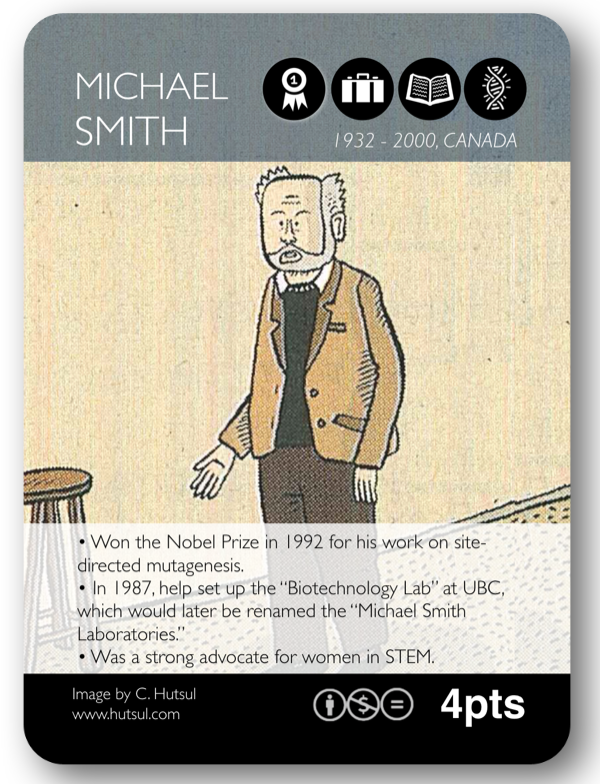Team: TBD
AMBL (pre-COVID) annually hosted a special and free full day science education conference. Here, we utilized a variety of UBC facilities, with help from various partners – this includes keynotes and a rotation of practical science experiment sessions for up to 90 participants.
You can see previous examples of our high school conferences, by clicking the year links:
2016 | 2015 | 2014 | 2013 | 2012 | 2011 | 2010 | 2009 | 2008
This conference is especially designed for Grade 11 and 12 high school students, and tends to be scheduled during the fall. Programming template (from 2018) can be seen below.

General Information and Schedule For October 2nd, 2018
This event showcases various scientific pursuits, including the opportunity for you to engage in hands-on activities, as well as interact with some of the most prominent scientists in the world. This year’s program is special in that it celebrates the 25th Anniversary of Michael Smith winning his Nobel Prize. We’re going to explore a variety of molecular biology themed pursuits. Note that targeted audience is Grade 11 and 12 students, but we do on occasion have a few Grade 10s as well.
VENUE: This conference will start at the Life Science Centre (LSC), and will end at the Michael Smith Building (MSB). For directions to the LSC, please click on this link. For directions to the MSB, please click on this link.
Conference doors will open as early as 8:00am, with the program starting at 8:30am SHARP. See below for full schedule details.
08:00 – 08:30 Doors open. We will begin in room LSC2 (there will be registration tables just outside, where you can find your nametag).
08:30 – 08:45 WELCOME FROM Dr. David Ng
08:45 – 09:15 Dr. Phil Hieter
09:15 – 09:45 Dr. Molly Schoichet
09:45 – 09:55 Introduction to activity rotations. Note that there are two streams of activities. One hosted at the Michael Smith Labs, and the other at the LSC (Department of Microbiology and Immunology) – see below for details (students will be assigned to a stream based on their registration preferences).
10:10 – 11:10 Rotation #1
11:15 – 12:15 Rotation #2
12:15 – 13:15 LUNCH (on your own)
13:20 – 14:20 Rotation #3
14:20 – 14:55 Everyone congregates in the foyer at the Michael Smith Labs. Closing words and raffle draw prizes.
15:00PM END
HANDS-ON/INTERACTIVE ACTIVITIES for the 2018 Conference include:
Stream 1 at the Michael Smith Laboratories: (meet at the foyer of the Michael Smith Laboratories)
1. Genomic DNA Isolation (host: GenomeBC): Students will perform a standard genomic DNA isolation from their own cheek cells, such that they will have a sample that they can take home. Discussions around concepts of genomics will also be entertained.
2. Microbial Biodiversity Lab (host: David Ng): Students will use dissecting microscopes to explore the microbial world found within a riparian ecosystem (and help Dave obtain images of various organisms for a card game to be used by the public school community). Discussions will revolve around microbial biodiversity with both an emphasis on ecology as well as introduction of concepts around microbiome analysis.
3. Tour of the Michael Smith Laboratories (host: MSL): Students will be broken into smaller groups and will be given a guided tour through some of the research labs within the MSL.
Stream 2 at the Life Science Center: (meet right outside the LSC2 lecture hall)
1. Cell Culture Lab: Students will be guided through a variety of wet lab exercises where they will have an opportunity to delve into the world of tissue culture.
This includes an introduction to the methodology around flow cytometry (a technique that can sort cells based on specific characteristics).
2. Imaging Lab: Students will participate in a microscopy section that will involve both techniques in epifluorescence and confocal imaging (a kind of microscopy technique that allows generation of 3 dimensional images).
3. Informal Q&A with graduate students on research life as well as discussions around the evidence based thinking and the problem of fake news.
SCIENTIST SPEAKER RESEARCH INTERESTS
Dr. Molly Shoichet, O.C. is Tier 1 Canada Research Chair in Tissue Engineering and Professor of Chemical Engineering at the University of Toronto. Dr. Shoichet is an expert in the study of polymers for drug delivery and tissue regeneration in the CNS and cancer. She is focused on science outreach and translation. She is the only person to be a fellow of Canada’s three National Academies; is foreign member of the US NAE, Killam Prize winner, and L’Oréal-UNESCO For Women in Science laureate.
(For more info, please see https://shoichetlab.utoronto.ca/)
Dr. Phil Hieter is recognized for his work on structural and regulatory proteins that ensure faithful segregation of chromosomes during cell division. His work has also demonstrated and advocated the value of yeast and other model experimental organisms for understanding mechanisms of human disease. He is a Fellow of the American Academy of Arts and Sciences, the American Association for the Advancement of Science, the Royal Society of Canada, and the American Academy of Microbiology. He was also a past President of the Genetics Society of America.
(For more info, please see http://hieterlab.msl.ubc.ca/)
Dr. David Ng (your host)
David is a geneticist, science educator, part time writer, and faculty based at the Michael Smith Laboratories at the University of British Columbia. His lab is interested in various areas of science literacy, and is particularly engaged when the notions of science and art intersect.
(see http://thisishowitalkscience.tumblr.com for more)

